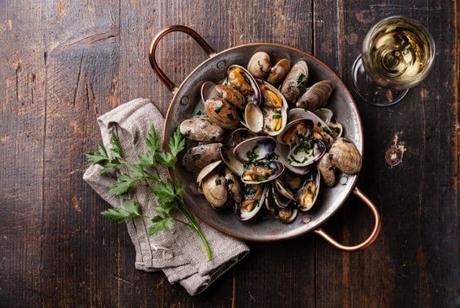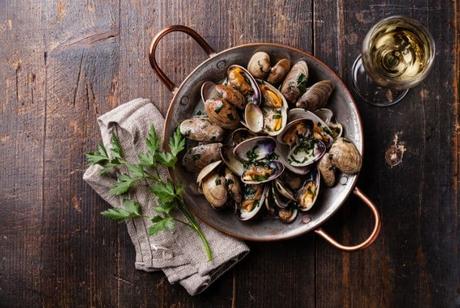Clams benefits include great for males’ fertility, great for collagen synthesis, contain lots of vitamin b12, provide iron, helps regulate blood pressure, loaded with protein, great for thyroid health, good for your heart, an excellent source of choline, and rich in riboflavin.
People know and enjoy eating clams thanks to their chewy texture and how great they taste when dipped in butter. They are also loaded with nutrients, are low in fat, and have heaps of iron and protein.

You can find many types of clams all over the world, but the ones you find at restaurants and grocery stores come from coastal areas with cold water and sandy shores. Fresh clams are in fact alive when you buy them, and smell like the ocean.
Shells should be closed tightly or close up when you tap on them. If a shell is open, that means the clam is dead. The shells will open as you cook them, which is normal.
If you are going to be making some clams for your next meal, take a moment to learn about the great health benefits of these mollusks. You will love them so much more!
11 Ultimate Health Benefits of Clams
1. Great for Males’ Fertility
Zinc and selenium are important for men in the production of sperm and seminal fluid. These are found in abundance in clams. Clams help promote the synthesis of testosterone, and they help sperm motility, too.
Sperm count also is improved, and the chances of deformed sperm being made are also lowered. It is great news for men who would like to become fathers-so men, eat those clams!
2. Great for Collagen Synthesis
Collagen is a protein found in the human body. It is critical in maintaining your skin, mucous membranes, joints, and other cells. Many of us do not get enough collagen. You can consume supplements to get what you need-but many of us do not.
One way to improve your collagen production is to make sure you’re getting enough Vitamin C. Clams to help you get that vital nutrient.
Vitamin C is also important in helping you get enough iron; which clams contain plenty of. And we all know that Vitamin C is important for supporting your immune system.
In sum, eating clams supports your overall good health, thanks to its Vitamin C content.
3. Contain Lots of Vitamin B12
Clams are a GREAT source of Vitamin B12. You get 824% of the recommended daily intake per 100 grams of clams! Many people think that beef is the best way to get your B12, but the fact of the matter is that clams are far better.
Vitamin B12 is great for us humans because it helps us produce red blood cells, synthesize proteins, and make and maintain our DNA.
Vitamin B12 is also consumed for memory loss, slowing down aging, and to boost one’s mood and energy. Some people even use Vitamin B12 for Lou Gehrig’s disease, Multiple Sclerosis, and to prevent macular degeneration.
4. Clams Provide Iron
We talked about this before, but let’s go into detail about how great clams are for iron. The most abundant nutrient aside from Vitamin B12 in clams is iron. Per 6 oz of clams, you will get 23.8 mg of iron.
It gives you 132% of the recommended daily intake. We need iron for many of our metabolic processes, and it helps us transport oxygen, too.
It also prevents us from becoming anemic. Iron deficiency anemia is much more common than we think – even in the USA, it is estimated that 10 million people have an iron deficiency.
5. Helps You Regulate Blood Pressure
High blood pressure is what some experts call “the silent killer.” It wreaks havoc on your body, and you don’t even know it. But simple dietary changes can help you to get those levels down.
Consuming potassium is just one way to possibly help lower those levels. Just 4.7 grams a day can help you out.
High potassium foods like baked clams, sweet potatoes, and lentils-among other great tasting foods-can help you reach these levels. Limit your sodium and add in more potassium-your body will thank you!
6. Loaded with Protein
Protein is so important to us! These are the foundational blocks of everyday life. Every cell in our human body has protein. Protein is necessary for your diet so that you can repair your body’s cells and produce new ones when needed.
Kids and teens need plenty of protein to grow and develop. Pregnant women also need it to ensure the health and development of their growing baby.
It should also be noted that the basic makeup of protein is a chain of amino acids. There are different types of amino acids our bodies need, says MedlinePlus:
Nonessential Amino Acids: Made by the body from essential amino acids, or during the breakdown of protein
Essential Amino Acids: These cannot be made by our body-they must come from food.
Conditional Amino Acids: Needed during periods of stress and sickness.
So, what’s the point? Clams are a great source of protein. You get 12.8 g of protein per 100g. And if you’re watching your calories, 100g of clams is just 74 calories! It is great news for people on diets.
7. Great for Thyroid Health
Seafood is a prime source of iodine. After all, seawater contains this mineral naturally. Clams trap this mineral in their bodies, and as a result, consumers of this shellfish are treated to a high dose of the mineral.
Iodine is essential to the production of thyroid hormones. Our bodies do not make this nutrient, so you must get enough in your diet, says the American Thyroid Association.
Not getting enough iodine results in a deficiency, which can lead to hypothyroidism and possibly intellectual disabilities in kids and babies whose moms did not consume enough iodine during their pregnancies.
Clams also contain a high dose of copper, which works with iodine to ensure the body produces enough thyroid hormone.
8. Good for Your Heart
Clams contain a healthy serving of Omega-3 Fatty Acids. Just one 3 oz serving of clams will provide you with 140 mg of Omega-3’s, and it is recommended that you consume at least 250 to 500 mg each day.
Many people don’t like the taste of fatty fish, and the smell of the Omega-3 capsules can be a real turn-off. Therefore, clams are a great way to get what you need in a delicious way.
Omega-3’s are beneficial because they support the flexibility of the blood vessels, lower elevated levels of triglycerides, and may even help lower depression.
They help lower the chance of harmful plaques developing on the inside of the walls of your blood vessels, which can obstruct the flow of blood and thus raise your risk of stroke or heart attack.
9. Prevents RA (Rheumatoid Arthritis)
Clams are rich in selenium, having 24.3 mcg per 100g. It may help people affected by RA.
It should be noted that rheumatoid arthritis is an autoimmune disorder, and researchers still do not clearly know what triggers it. However, research shows that a deficiency of selenium contributes to its growth.
We also want to make clear that research on the effects of selenium and rheumatoid arthritis are mixed in nature.
Some information suggests that consuming selenium does not help; other suggest that taking 200mcg of selenium each day for three months will reduce the swelling of the joints and the stiffness that comes as a result of RA.
10. Excellent Source of Choline
Choline is an essential nutrient, but not a vitamin. It is critical to the health of your liver and helps protect you against fatty liver disease. Some studies even suggest that having adequate choline intake can help prevent diseases such as Alzheimer’s and dementia.
We also need choline to produce acetylcholine, which is beneficial for our memories and brain function as a whole. Experts recommend that adults consume at least 425-550 mg of choline each day.
Choline is also crucial for your cell membrane structure, too. Our body produces a small amount of this nutrient, but you should get more by eating clams. Other foods that contain this include legumes, peas, nuts, beans, wheat germ, and spinach, to name a few.
11. Rich in Riboflavin
Riboflavin is also known as Vitamin B2, and clams are a great source of this vitamin. Riboflavin is excellent because it helps your brain health.
If you suffer from headaches or migraines, you may be facing a deficiency in riboflavin. After all, it is a very common thing thanks to the vitamin being water-soluble.
The flavoproteins required to metabolize fatty acids in the brain and regulate hormones are found in riboflavins. Also, it is excellent for your cardiovascular health, supports the health of your eyes, and may help reduce the symptoms of depression.
You can find it not only in clams, but also in spinach, beet greens, and wild-caught Alaskan salmon, to name a few great sources.
Conclusion
The next time you are invited to a clambake or have the chance to eat clams, take it. The health benefits are numerous.
Plus, they taste great, are low in calories, and can be found at most grocery stores or fish markets.
Even if you don’t know how to prepare them, YouTube tutorials are available, and before you know it, you will be enjoying delicious clams.
References:
https://www.livestrong.com/article/5384-need-health-benefits-clams/
https://www.webmd.com/vitamins/ai/ingredientmono-1003/selenium


